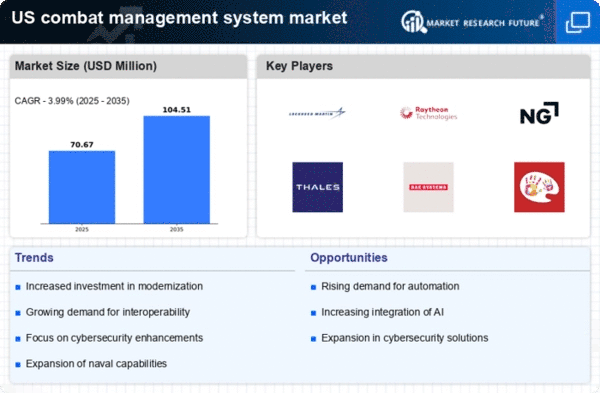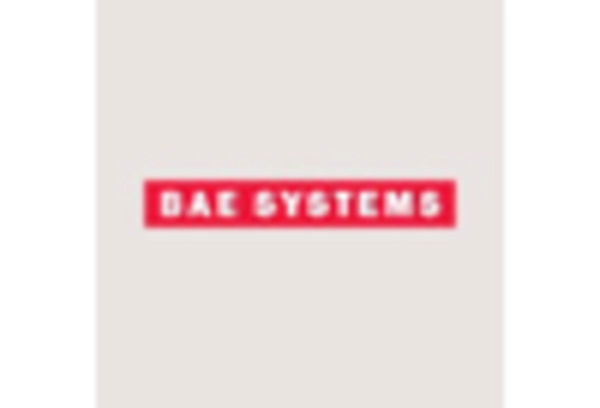Increased Defense Budgets
The combat management-system market is significantly influenced by the increase in defense budgets across various branches of the military. In recent years, the US government has allocated substantial funds to modernize its defense capabilities, with a focus on enhancing command and control systems. For instance, the defense budget for 2025 is estimated to exceed $800 billion, with a notable portion earmarked for advanced technology initiatives. This financial commitment indicates a strong demand for sophisticated combat management systems that can integrate with existing military infrastructure. As defense budgets continue to rise, the combat management system market is likely to see increased investments, fostering innovation and development in this critical sector.
Growing Geopolitical Tensions
The combat management-system market is being propelled by growing geopolitical tensions and the need for enhanced military readiness. As nations face evolving security challenges, there is a heightened emphasis on developing robust defense strategies. The US military is increasingly focused on modernizing its combat capabilities to address potential threats from adversaries. This strategic shift is likely to drive demand for advanced combat management systems that can facilitate effective coordination and response in complex operational environments. The market is expected to expand as military organizations prioritize investments in technologies that enhance their operational readiness and strategic deterrence.
Focus on Data-Driven Decision Making
The combat management-system market is evolving towards a focus on data-driven decision making, which is becoming essential for modern military operations. The ability to analyze vast amounts of data in real-time allows military commanders to make informed decisions quickly. This trend is being driven by advancements in data analytics and artificial intelligence, which are being integrated into combat management systems. As military operations become more complex, the demand for systems that can process and interpret data effectively is likely to increase. Consequently, the combat management-system market is expected to grow as organizations prioritize the development of capabilities that enhance situational awareness and operational effectiveness.
Demand for Enhanced Training Solutions
The combat management-system market is witnessing a rising demand for enhanced training solutions that utilize advanced simulation technologies. Military organizations are increasingly recognizing the importance of effective training programs to prepare personnel for real-world combat scenarios. By integrating combat management systems into training exercises, armed forces can create realistic environments that improve decision-making and operational efficiency. This trend is likely to contribute to market growth, as defense agencies seek to invest in systems that provide comprehensive training solutions. The combat management-system market is thus positioned to benefit from the increasing focus on training and readiness initiatives.
Technological Advancements in Defense Systems
The combat management-system market is experiencing a surge due to rapid technological advancements in defense systems. Innovations in software and hardware are enhancing the capabilities of these systems, allowing for improved situational awareness and decision-making. The integration of advanced sensors and communication technologies is enabling real-time data sharing among various military assets. As a result, the market is projected to grow at a CAGR of approximately 6.5% from 2025 to 2030. This growth is driven by the need for modernized defense solutions that can effectively respond to evolving threats. The combat management system market is thus positioned to benefit from these advancements, as military organizations seek to enhance their operational effectiveness and maintain a strategic edge.
















